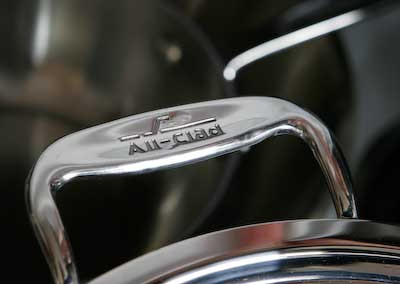My First Fork
A preference for one thing over another is innate. However, stating a preference – declaring that one type of food, music, or way of thinking is better than another – can be perceived by some as being elitist, arrogant, or as they say in the U.K., “up one’s self”.
My parents had what I would call a "modest" kitchen. Dishes were unremarkable and unbreakable melamine or “Corelware”, flatware was modest and no more than three of any utensil matched. Table knives were dull and/or serrated, prep knives looked as if they'd been used to hack through the wilderness somewhere. It all matched the skills and passion my parents had for food. Neither utensils nor owner felt slighted; they were in perfect harmony.
While cleaning out my deceased mother’s house, I came across a random but remarkable memento; a single artifact which I think helped uncover my early interest in food and how it’s consumed – a fork. Distinct from the rest, it’s a bit too ornate for my taste but implied that the object had value. It was also heavy compared to the stamped sheet-metal flatware it shared a drawer with. Yet, that weight was in balance and felt right in my hands. It became my preferred fork whenever it was available in the drawer. I've no idea where it came from nor why we only had one of them (I suspect a neighbor brought it over and it was orphaned along the way).
I wonder if anyone else in my small family noticed it. Could they reach into a silverware drawer and grab just any old fork when this one was there? Were they all equal candidates for conveying such important cargo?
Surely this single piece of metal is at least partially responsible for (or indicative of) my tendency toward better utensils now. Dining out regularly exposed me to dishes and glasses and forks and knives, and much like that childhood fork, I found one company and one style that reminded me of that balance I first enjoyed so long ago, an Italian company called Sambonet. It took me years to get enough light and focus to read the convoluted logo on the forks. Only later did I noticed the knives were stamped clearly with the name of the company. I ordered a set as soon as I could find them online. They certainly weren't cheap, but they’ll be with me for a very long time. And so will that first fork.
To say that this flatware improves the taste of the food would be a baseless claim, but it does improve my enjoyment of it; a testimony to the complexity of food.
My parents had what I would call a "modest" kitchen. Dishes were unremarkable and unbreakable melamine or “Corelware”, flatware was modest and no more than three of any utensil matched. Table knives were dull and/or serrated, prep knives looked as if they'd been used to hack through the wilderness somewhere. It all matched the skills and passion my parents had for food. Neither utensils nor owner felt slighted; they were in perfect harmony.
While cleaning out my deceased mother’s house, I came across a random but remarkable memento; a single artifact which I think helped uncover my early interest in food and how it’s consumed – a fork. Distinct from the rest, it’s a bit too ornate for my taste but implied that the object had value. It was also heavy compared to the stamped sheet-metal flatware it shared a drawer with. Yet, that weight was in balance and felt right in my hands. It became my preferred fork whenever it was available in the drawer. I've no idea where it came from nor why we only had one of them (I suspect a neighbor brought it over and it was orphaned along the way).
I wonder if anyone else in my small family noticed it. Could they reach into a silverware drawer and grab just any old fork when this one was there? Were they all equal candidates for conveying such important cargo?
Surely this single piece of metal is at least partially responsible for (or indicative of) my tendency toward better utensils now. Dining out regularly exposed me to dishes and glasses and forks and knives, and much like that childhood fork, I found one company and one style that reminded me of that balance I first enjoyed so long ago, an Italian company called Sambonet. It took me years to get enough light and focus to read the convoluted logo on the forks. Only later did I noticed the knives were stamped clearly with the name of the company. I ordered a set as soon as I could find them online. They certainly weren't cheap, but they’ll be with me for a very long time. And so will that first fork.
To say that this flatware improves the taste of the food would be a baseless claim, but it does improve my enjoyment of it; a testimony to the complexity of food.

Comments